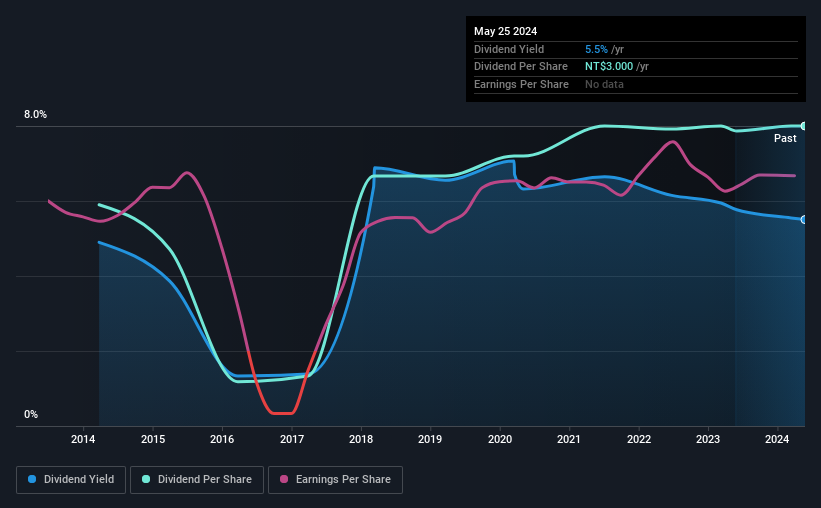The board of Dafeng TV Ltd. (TWSE:6184) has announced that it will pay a dividend on the 12th of July, with investors receiving NT$3.00 per share. This payment means that the dividend yield will be 5.5%, which is around the industry average.
See our latest analysis for Dafeng TV
Dafeng TV's Dividend Is Well Covered By Earnings
We aren't too impressed by dividend yields unless they can be sustained over time. Before making this announcement, Dafeng TV was paying out quite a large proportion of both earnings and cash flow, with the dividend being 159% of cash flows. Paying out such a high proportion of cash flows can expose the business to needing to cut the dividend if the business runs into some challenges.
Earnings per share could rise by 6.5% over the next year if things go the same way as they have for the last few years. Assuming the dividend continues along recent trends, our estimates say the payout ratio could reach 87%, which is definitely on the higher side, but we wouldn't necessarily say this is unsustainable.

Dividend Volatility
The company has a long dividend track record, but it doesn't look great with cuts in the past. The annual payment during the last 10 years was NT$2.21 in 2014, and the most recent fiscal year payment was NT$3.00. This implies that the company grew its distributions at a yearly rate of about 3.1% over that duration. Modest growth in the dividend is good to see, but we think this is offset by historical cuts to the payments. It is hard to live on a dividend income if the company's earnings are not consistent.
We Could See Dafeng TV's Dividend Growing
Given that the dividend has been cut in the past, we need to check if earnings are growing and if that might lead to stronger dividends in the future. We are encouraged to see that Dafeng TV has grown earnings per share at 6.5% per year over the past five years. Recently, the company has been able to grow earnings at a decent rate, but with the payout ratio on the higher end we don't think the dividend has many prospects for growth.
The Dividend Could Prove To Be Unreliable
In summary, while it's good to see that the dividend hasn't been cut, we are a bit cautious about Dafeng TV's payments, as there could be some issues with sustaining them into the future. The payments are bit high to be considered sustainable, and the track record isn't the best. Overall, we don't think this company has the makings of a good income stock.
Investors generally tend to favour companies with a consistent, stable dividend policy as opposed to those operating an irregular one. However, there are other things to consider for investors when analysing stock performance. Taking the debate a bit further, we've identified 1 warning sign for Dafeng TV that investors need to be conscious of moving forward. Is Dafeng TV not quite the opportunity you were looking for? Why not check out our selection of top dividend stocks.
New: Manage All Your Stock Portfolios in One Place
We've created the ultimate portfolio companion for stock investors, and it's free.
• Connect an unlimited number of Portfolios and see your total in one currency
• Be alerted to new Warning Signs or Risks via email or mobile
• Track the Fair Value of your stocks
Have feedback on this article? Concerned about the content? Get in touch with us directly. Alternatively, email editorial-team (at) simplywallst.com.
This article by Simply Wall St is general in nature. We provide commentary based on historical data and analyst forecasts only using an unbiased methodology and our articles are not intended to be financial advice. It does not constitute a recommendation to buy or sell any stock, and does not take account of your objectives, or your financial situation. We aim to bring you long-term focused analysis driven by fundamental data. Note that our analysis may not factor in the latest price-sensitive company announcements or qualitative material. Simply Wall St has no position in any stocks mentioned.
About TWSE:6184
Dafeng TV
Engages in cable television system and broadband business in Taiwan.
Flawless balance sheet with solid track record and pays a dividend.
Similar Companies
Market Insights
Community Narratives




